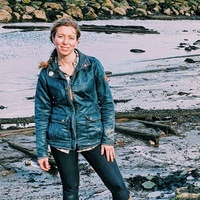
BA (Hons), MA, ACIfA
Research PG
- About
-
- School/Department
- School of Geosciences
Biography
Ellie Graham is an archaeologist undertaking a PhD under the QUADRAT DTP. This project will employ drone based survey methods to research the impacts of climate-driven coastal change on Scotland’s rich archaeological heritage. It aims to map eroding sites and track coastal change in order to understand and mitigate the effects of erosion, developing methods to help the sector address the threat, and ultimately contribute to improved management of the coastal archaeological resource.
Having completed a BA in Egyptology and Ancient History at the University of Wales, Swansea, Ellie volunteered with the Glamorgan-Gwent Archaeological Trust (http://www.ggat.org.uk/) in South Wales, which led to a graduate placement, and then to a permanent position. This role, encompassed a range of work, including commercial excavation, large-scale research-led landscape surveys, public archaeology projects and heritage management.
While working full time, she completed a part time MA in Professional and Applied Archaeology with the University of Birmingham. With a commitment to developing community projects and public engagement, Ellie was involved with the South Wales branch of the CBA's Young Archaeologists Club, worked on a number of community and student training excavations, and ran GGAT’s Arfordir project (‘coastline’ in Welsh; http://www.ggat.org.uk/arfordir/) which worked with and trained local communities to record and monitor archaeological sites in the coastal zone. Building on this experience, Ellie moved to the University of St Andrews in 2012, working with the SCAPE Trust (https://scapetrust.org/) undertaking research on Scotland’s coastal archaeology, particularly where affected by coastal processes, and engaging the public with this work. Ellie brings eight years of experience with SCAPE and firsthand knowledge of Scotland's coastal archaeological sites and the urgency of the threat they are facing to her PhD research.
Qualifications
- BA (Hons) Egyptology & Ancient History2005 - University of Wales, Swansea
- MA Practical Archaeology2011 - University of Birmingham(Distinction)
External Memberships
Associate of the Chartered Institute for Archaeologists
- Research
-
Research Overview
Coastal archaeology, remote sensing, drone based survey, community archaeology, climate impacts, landscape archaeology
Current Research
NERC-funded PhD studentship through the QUADRAT DTP: Mitigating the impacts of environmental change on cultural heritage using drone-based survey techniques
Much of Scotland’s rich archaeological heritage is located at the coast, so is vulnerable to destruction through erosion and other coastal processes which will be exacerbated by climate change. My research aims to mitigate those impacts by employing drone-based survey methods to map fragile sites and coastlines, track changes in their condition and prospect for as-yet undiscovered sites, targeting a variety of different landscapes and environments.
Fieldwork will involve low-level aerial photography which will be used to generate high-resolution 3-dimensional models, employing structure from motion software to build Digital Surface Models and orthorectified photographs. I’ll also use drone-mounted LiDAR survey and multi-spectral cameras to detect buried features and test the effectiveness of different techniques. The results of these surveys will then form the basis of GIS-based analysis and visualisation.
As well as providing a detailed record and generating new information about individual sites and their landscape setting, these surveys will document their current condition, assess their vulnerability and provide a baseline against which future changes can be mapped. This can also be used to assess coastal change at local and landscape level, through comparison with past surveys and historic maps. Survey results will be used in analysis of recent coastal loss, reconstruction of past coastlines, calculations of erosion rates and projections of future vulnerability.
I also hope to integrate community engagement by incorporating traditional ground-based recording methods. In the context of coastal change, rapid responses and continuous monitoring are essential, for which local communities are ideally placed.
Ultimately, I hope that this research can inform decisions about prioritisation of sites for further investigation, contribute to improved management of Scotland’s threatened coastal archaeological resource, and develop tools for archaeologists and heritage managers to mitigate the impacts of climate-driven coastal and environmental change.
